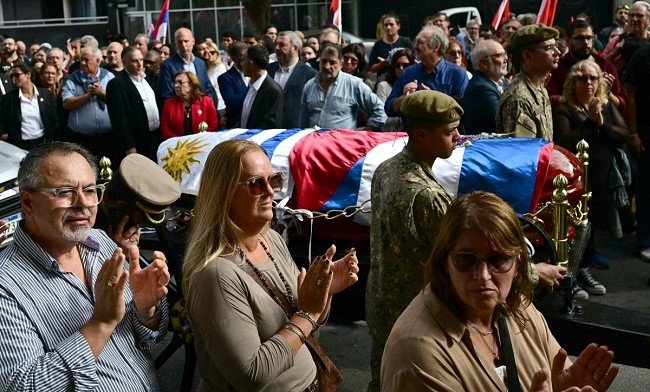THOUSANDS of Uruguayans lined the streets of Montevideo Wednesday to bid farewell to deceased former leader Jose “Pepe” Mujica, famed for his humility and once known as the “world’s poorest president.”
The 89-year-old erstwhile leftist guerrilla, who spent a dozen years behind bars for revolutionary activity, lost a year-long battle against cancer on Tuesday.
He passed away at his humble home on a small farm on the outskirts of the Uruguayan capital with his wife, fellow revolutionary fighter Lucia Topolansky, by his side.
Topolansky, 80, and President Yamandu Orsi, Mujica’s political heir, on Wednesday led a funeral procession with the former leader’s coffin, draped in the Uruguayan flag, on a simple horse-drawn carriage.
The cortege made its way to loud applause from the presidential headquarters to the legislative palace, where Mujica will lie in state.
“Thank you, Pepe,” some people shouted as the procession passed them.
Some mourners waved banners reading “Hasta siempre, Pepe” (Until Forever, Pepe), a slogan associated with Argentine revolutionary Che Guevara.
Orsi has announced three days of national mourning.
The funeral cortege of Uruguay’s former President Jose ‘Pepe’ Mujica makes its way in downtown Montevideo, on May 14, 2025, a day after his death. Mujica, an ex-guerrilla fighter and hero of the Latin American left, died on May 13, 2025 at the age of 89. (Photo by Pablo PORCIUNCULA / AFP)
Mujica earned the moniker “world’s poorest president” during his 2010-2015 presidency for giving away much of his salary to charity, driving himself in a sky blue Volkswagen Beetle, and continuing to live a simple life with his wife and three-legged dog.
Leftist leaders from across Latin America and Europe have paid tribute to the man described by Mexican President Claudia Sheinbaum as an “example for Latin America and the entire world.”
Brazilian President Luiz Inacio Lula da Silva said Mujica’s “human greatness transcended the borders of Uruguay and his presidential mandate.”
Lula said he would travel to Montevideo for the funeral.
Mujica transformed Uruguay, a prosperous country of 3.4 million people best known for football and ranching, into one of Latin America’s most progressive societies.
He legalized abortion and gay marriage and made Uruguay the first country to allow the use of recreational cannabis.
In Montevideo, people recalled a man who practiced what he preached.
“He felt and lived like ordinary people, not like today’s politicians,” said Walter Larus, a waiter at a corner cafe in Montevideo of which Mujica was a patron.
“He was a man who dedicated his life to the cause of the poor,” added Mauro de los Reyes, a 50-year-old teacher.







